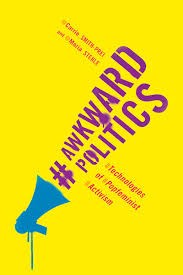How have digital tools changed and altered the goals, meanings and reception of contemporary feminist activism? In Awkward Politics: Technologies of Popfeminist Activism, Carrie Smith-Prei and Maria Stehle use ‘awkwardness’ as a prism through which to think about 21st-century feminist movements that utilise transnational media from hashtags to film, literature, theory and blogs. This is not only a thorough study of digital feminist activism, finds Sofia Ropek Hewson, but also an unabashedly hopeful book.
Awkward Politics: Technologies of Popfeminist Activism. Carrie Smith-Prei and Maria Stehle. McGill-Queen’s University Press. 2016.
With Awkward Politics: Technologies of Popfeminist Activism, Carrie Smith-Prei and Maria Stehle have written a detailed and engaging study of contemporary feminist activism that examines the successes and failures of its digital forms. The ‘awkward’ in the title refers to their methodology, as well as a type of politics they have identified: they write that ‘awkward’ means a ‘misdirected motion’, movement that ‘messes with timing […] space and location’. According to Stehle and Smith-Prei, awkwardness is uncomfortable, relatable and a ‘politics of becoming, defiance and disruption’.
Through chapters on ‘popfeminism’ in film and literature, viral politics and feminism and on how to develop an ‘awkward ethos’, the authors explore the importance of awkwardness and its relation to feminist politics. The protest punk group Pussy Riot, the author Charlotte Roche and the actor/rapper Lady Bitch Ray are prominent subjects of their discussions. The authors also focus on four main features of economic neoliberalism that awkward politics is capable of confronting or harnessing: namely, cruel optimism; willfulness; circularity; and (the somewhat ill-defined) joy.
Firstly, ‘cruel optimism’, as defined by Lauren Berlant: ‘optimism is cruel when the object/ scene that ignites a sense of possibility actually makes it impossible to attain the expansive transformation for which a person or a people risks striving.’ Cruel optimism, according to Berlant, is a defining feature of neoliberalism, binding people to situations of ‘profound threat’ that are also problematically ‘confirming’ and ‘sustaining’. Stehle and Smith-Prei write that using awkwardness as a popfeminist methodology means ‘uncovering disruptions of the cruel optimism of neoliberalism’.
Awkwardness is capable of discovering ‘new avenues for connection and relatability and searching for new spaces for feminist community and joy’. An example used is the proliferation of SlutWalks, which are protest marches against rape culture that began when a Toronto police officer suggested that ‘women should avoid dressing like sluts’ in order to prevent sexual assault. SlutWalks, the authors write, play with the ‘cruel optimistic mechanisms’ of neoliberalism through a celebration of ‘inappropriateness and joy’. SlutWalks are undoubtedly powerful, but their specific relation to the mechanisms of cruel optimism remains unclear.
 Image Credit: Chapas Ladyfest (gaelx CC BY SA 2.0)
Image Credit: Chapas Ladyfest (gaelx CC BY SA 2.0)
‘Willfulness’ is another intriguing element of awkward politics, deriving from Sara Ahmed’s book, Willful Subjects. Stehle and Smith-Prei write that a willful child ‘stubbornly misbehaves, and does not conform to parental and societal expectations’. Willful children are usually girls, therefore ‘willful’ is a word to be reappropriated; as Ahmed writes: ‘transform this judgment into a project.’ Willfulness is ‘something that defies expectations’, something awkward and often related to adolescence or, as Smith-Prei and Stehle describe it, the process of ‘becoming’. Willfulness relates powerfully to awkwardness through its connections to adolescence and expectations; the authors write that awkwardness is ‘very much of the body’, but also ‘social and ephemeral’. This also describes ‘wilfulness’: the often awkward, bodily discomfort related to being an adolescent girl, combined with a will to social and cultural stubbornness.
The word ‘circularity’ also frequently appears in Awkward Politics, which Stehle and Smith-Prei seem to use as shorthand for Judith Butler’s conception of the repetition of gender norms. Butler writes in Gender Trouble that the task is ‘not whether to repeat, but how to repeat, or indeed to repeat and through a radical proliferation of gender to displace the very gender norms that enable the repetition itself’. Butler suggests that the (inevitable) cultural repetition of gender norms is capable of destabilising whatever engendered the repetition in the first place. Similarly, Smith-Prei and Stehle’s conception of ‘circularity’ is about ‘always returning to the point of origin’, but somehow, on the way, destabilising it. For the authors, circularity also describes the close relationship between popfeminism and neoliberalism. They write: ‘it is constantly and consciously in danger of becoming an object of consumption’; they add that ‘these kinds of activisms can easily and simply be funnelled back in to a mainstream neoliberal discourse where they lose any kind of politically progressive edge’. For example, the authors cite Pussy Riot appearing on an episode of House of Cards.
However, ‘speed’ and ‘closeness’ enable possible disruptions of this relationship. Smith-Prei and Stehle write that ‘the speed at which messages and images spread in the digital age […] creates clear moments of political intervention and disturbance’. Similarly, the closeness of protest actions and the object of the protest can be productive. They write that digital campaigns often result in counter-campaigns that use the same image or hashtag to ‘subvert the original message’. The example they use is the ‘I am a feminist because…’ campaign, where feminists held up boards describing why they were feminists. This campaign provoked the ‘I am not a feminist because…’ counter-protest, which used the same image and format. Smith-Prei and Stehle observe that ‘the relationship between the two campaigns is awkward in that one relies on the other to get its message across, thereby destabilising the effectiveness of both’. They add that the ‘co-option of the ‘‘I am a feminist because’’ campaign enhances the visibility of both campaigns without voiding the political meaning of either, the controversy adds effect and urgency to both’. Thus, the authors conclude that digital protest is not about distancing oneself from the object of protest through ‘ironic provocation’; rather, protests using hashtags and images are often close and (productively) awkward.
Smith-Prei and Stehle write that their examples all ‘show once again that there is no outside of capitalism in a global neoliberal economy’. However, they also note that awkward politics ‘sticks’ to the economy in an ‘uncomfortable manner’, drawing on Ahmed’s writing on relationality and ‘stickiness’: ‘this stickiness contains the suggestion that there must be different modes of life, connection and community outside of the consumption patterns and identity stylings that drive neoliberal economies.’ Awkward Politics, despite initially implying the contrary, is driven by a hope for some kind of elusive ‘outside’, characterised by their buzzwords: ‘joy’, ‘community’ and ‘collaboration’. They write that awkward politics stick to neoliberal economies, but is ‘threatening to detach from what is already not working’; however, they fail to elaborate on the precise threat to neoliberalism of, for example, Pussy Riot declining to appear on a second episode of House of Cards or how this process of ‘detachment’ might happen.
But, ultimately, Awkward Politics is an unabashedly hopeful book: it wants to ‘push back on cynicism’ and places its authors at the centre of its narrative. They write that ‘instead of burying the researcher in an ostensibly objective view of the subject matter, we place ourselves, subjectively, at the forefront of these discussions’. They explore their own voices, histories and experiences, and the book is enriched for them, even if their calls for nebulous feminist ‘joy’ and ‘collaboration’ are sometimes grating or unexplained. Awkward Politics is a thorough study of digital feminist activism, with particularly compelling insights into ‘willfulness’, ‘circularity’ and the closeness of protest and the protested, and is recommended for students broadly familiar with terms and concepts relating to Marxist, feminist and affect theories.
Sofia Ropek Hewson is a French PhD student at Cambridge, researching transgression and political literature. She tweets at @sofiahewson. Read more by Sofia Ropek Hewson.
Note: This review gives the views of the author, and not the position of the LSE Review of Books blog, or of the London School of Economics.


 Find this book:
Find this book: 




1 Comments